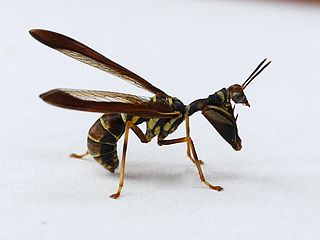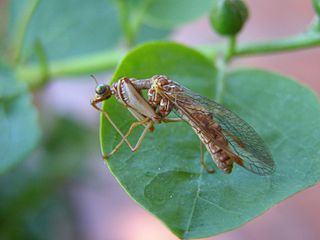 W
WThe Mantispoidea are a superfamily of insects in the suborder Hemerobiiformia.
 W
WThe Berothidae are a family of winged insects of the order Neuroptera. They are known commonly as the beaded lacewings. The family was first named by Anton Handlirsch in 1906.
 W
WClimaciella brunnea, known sometimes by the common names wasp mantidfly and brown mantidfly, is a predatory neuropteran insect in the family Mantispidae.
 W
WDipteromantispidae is an extinct family of neuropterans known from the Cretaceous period. Unlike other neuropterans, the family possesses only a single set of fully developed forewings, with the hindwings reduced to haltere like structures. They are generally small in size and possess raptorial forelegs. They are considered to belong to Mantispoidea, with an uncertain position within the clade.
 W
WMantispa is the type genus of insects in the family Mantispidae and subfamily Mantispinae. Species have a fairly worldwide distribution.
 W
WMantispa styriaca, the Styrian praying lacewing, is a species of predatory mantidfly native to Europe. It is a yellow-brown insect as an adult and has multiple larval stages.
 W
WMantispidae, known commonly as mantidflies, mantispids, mantid lacewings, mantisflies or mantis-flies, is a family of small to moderate-sized insects in the order Neuroptera. There are many genera with around 400 species worldwide, especially in the tropics and subtropics. Only 5 species of Mantispa occur in Europe.
 W
WRhachiberothidae, sometimes called thorny lacewings, are a family of winged insects in the order Neuroptera. The family has only 14 extant species in 4 genera found in Sub-Saharan Africa, but has a diverse fossil record extending back to the Early Cretaceous in Lebanon, Eurasia and North America.